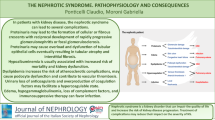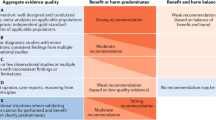Abstract
Polyneuropathy, organomegaly, endocrinopathy, M-protein, and skin changes (POEMS) syndrome is a multisystem disorder associated with plasma cell dyscrasia. Elevated serum levels of vascular endothelial growth factor (VEGF), which strongly promotes neovascularization and vasopermeability, are considered to be responsible for the characteristic symptoms such as angiomata, pleural effusion/ascites, edema, and organomegaly in the disorder. To study whether other angiogenetic factors are upregulated in POEMS syndrome, we measured serum levels of basic fibroblast growth factor and hepatocyte growth factor (HGF), as well as VEGF, in 17 patients with POEMS syndrome. All these factors were significantly upregulated in the POEMS syndrome patients. After the treatment with anti-VEGF antibody, the levels of HGF did not change, suggesting that elevation of HGF levels is not secondary to VEGF overproduction. These results suggest that different angiogenetic factors might contribute to the pathogenesis of POEMS syndrome, and this fact might contribute to the insufficient clinical effects obtained by suppression of VEGF alone.


Similar content being viewed by others
References
Bardwick PA, Zvaifler NJ, Gill GN et al (1980) Plasma cell dyscrasia with polyneuropathy, organomegaly, endocrinopathy, M protein, and skin changes: the POEMS syndrome. Report on two cases and a review of the literature. Medicine (Baltimore) 59(4):311–322
Dispenzieri A, Kyle RA, Lacy MQ et al (2003) POEMS syndrome: definitions and long-term outcome. Blood 101(7):2496–2506
Weis SM, Cheresh DA (2005) Pathophysiological consequences of VEGF-induced vascular permeability. Nature 437(7058):497–504
Watanabe O, Arimura K, Kitajima I et al (1996) Greatly raised vascular endothelial growth factor (VEGF) in POEMS syndrome. Lancet 347(9002):702
Nakajima H, Ishida S, Furutama D et al (2007) Expression of vascular endothelial growth factor by plasma cells in the sclerotic bone lesion of a patient with POEMS syndrome. J Neurol 254(4):531–533
Dispenzieri A, Moreno-Aspitia A, Suarez GA et al (2004) Peripheral blood stem cell transplantation in 16 patients with POEMS syndrome, and a review of the literature. Blood 104(10):3400–3407
Kuwabara S, Misawa S, Kanai K et al (2008) Neurologic improvement after peripheral blood stem cell transplantation in POEMS syndrome. Neurology 71(21):1691–1695
Straume O, Bergheim J, Ernst P (2006) Bevacizumab therapy for POEMS syndrome. Blood 107(12):4972–4973, author reply 4973–4974
Kanai K, Kuwabara S, Misawa S et al (2007) Failure of treatment with Anti-VEGF monoclonal antibody for long-standing POEMS syndrome. Internal Medicine 46(6):311–313
Imai N, Taguchi J, Yagi N et al (2009) Relapse of polyneuropathy, organomegaly, endocrinopathy, M-protein, and skin changes (POEMS) syndrome without increased level of vascular endothelial growth factor following successful autologous peripheral blood stem cell transplantation. Neuromuscul Disord 19(5):363–365
Murakami M, Simons M (2008) Fibroblast growth factor regulation of neovascularization. Curr Opin Hematol 15(3):215–220
Shimizu F, Sano Y, Abe MA et al (2011) Peripheral nerve pericytes modify the blood–nerve barrier function and tight junctional molecules through the secretion of various soluble factors. J Cell Physiol 226(1):255–266
Jiang WG, Martin TA, Matsumoto K et al (1999) Hepatocyte growth factor/scatter factor decreases the expression of occludin and transendothelial resistance (TER) and increases paracellular permeability in human vascular endothelial cells. J Cell Physiol 181(2):319–329
Martin TA, Watkins G, Mansel RE et al (2004) Hepatocyte growth factor disrupts tight junctions in human breast cancer cells. Cell Biol Int 28(5):361–371
Hashiguchi T, Arimura K, Matsumuro K et al (2000) Highly concentrated vascular endothelial growth factor in platelets in Crow–Fukase syndrome. Muscle Nerve 23(7):1051–1056
Rosti V, Massa M, Campanelli R et al (2007) Vascular endothelial growth factor promoted endothelial progenitor cell mobilization into the peripheral blood of a patient with POEMS syndrome. Haematologica 92(9):1291–1292
Koike H, Iijima M, Mori K et al (2008) Neuropathic pain correlates with myelinated fibre loss and cytokine profile in POEMS syndrome. J Neurol Neurosurg Psychiatry 79(10):1171–1179
Kanai K, Sawai S, Sogawa K et al (2012) Markedly upregulated serum interleukin-12 as a novel biomarker in POEMS syndrome. Neurology 79(6):575–582
Acknowledgments
This work was supported in part by the Health and Labour Sciences Research Grant on Intractable Diseases (Neuroimmunological Diseases) (S.K.) and by the Research Grant 16B-1 for Nervous and Mental Disorders (S.K.) from the Ministry of Health, Labour and Welfare of Japan.
Conflict of interest
The authors declare that they have no conflict of interest.
Author information
Authors and Affiliations
Corresponding author
Rights and permissions
About this article
Cite this article
Yamada, Y., Sawai, S., Misawa, S. et al. Multiple angiogenetic factors are upregulated in POEMS syndrome. Ann Hematol 92, 245–248 (2013). https://doi.org/10.1007/s00277-012-1583-2
Received:
Accepted:
Published:
Issue Date:
DOI: https://doi.org/10.1007/s00277-012-1583-2




